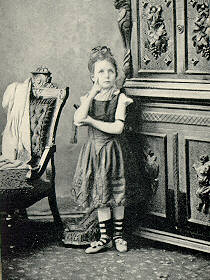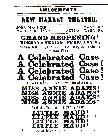
A Celebrated Case

=====From the book by Acton Davies=====
"Most of her scenes in that production were played with Miss Belle Doug lass, who was cast for a very important part. In order to be prepared for any emergency, Miss Doug lass memorized Maudie's lines as well as her own. When Maudie discovered this she was highly indignant, and exclaimed, "You needn't fret about me; I'm all right.' And later, when she was on the stage, Miss Doug lass afterwards told me that the child kept pinching her ears and whispering, "Don't boffer about me. If you get stuck I'll help you.'"
The play takes place in 1745 in Belgium. The War of Austrian Succession is on. At the opening of the play a major battle between the English and the French is about to take place. The hero of the play is a French soldier named Renaud who gets a package of jewels from a dying friend in order to take care of his friend's family.
The villain sees the exchange and later breaks into Renaud's house, steals the jewels and kills his wife who is the mother of their young daughter Adrienne who was played by Maude Adams. The child has to testify and, since she had been sent to her room, the can only testify about what she heard. That appears to make Renaud guilty of killing his wife and it is years before the real villain confesses and Renuad is set free.
The critic for The Chronicle wrote: "Little Maude Adams' perfectly childlike and natural manner as Renaud's child, rightly gained the sympathies of the audience, who fully appreciated the grace of Mr. O'Neil's act, in brining her before the curtain with him when recalled."
Another critic wrote: "The part by little Maude Adams was exceedingly well played by a child so young in years."
=====A History of the Theatre in America from Its Beginnings to the Present Time Vol. 2 by Arthur Hornblow; J.B. Lippincott Company, 1919=====
Now firmly established as a producing manager, Charles Frohman took a lease of Proctor's Twenty third Street Theatre and opened there September 8, 1890, with a new play by William Gillette called "All the Comforts of Home." In this play, Maude Adams, who played the rôle of Evangeline Bender, made her first appearance under Charles Frohman's management.
Maude Adams was born in 1872 at Salt Lake City, where her mother, Mrs. Annie Adams, was a member of the local stock company. She went on the stage at a very early age, first with J. K. Emmett, and then as the child in "A Celebrated Case."
=====American Theatre: A Chronicle of Comedy and Drama, 1869-1914 by Gerald Bordman; Oxford University Press, 1994=====
The season's biggest hit was yet another melodrama by the authors of The Two Orphans . D'Ennery land Cormon's A Celebrated Case ( 1-2378), Union Square) furthered the theatre's fame as the American home of French drama during the decade. The play had been hurried into production when Palmer ascertained that Wallack had unwittingly put into rehearsals a pirated version by the devious Boucicault. The gentlemanly Wallack immediately abandoned his mounting, a move that earned him Boucicault's publicly expressed venom. At its most simple, the dizzyingly convoluted plot showed how a French soldier, Jean Renaud ( Charles Coghlan), takes French leave to visit his child and his wife, who is murdered shortly after his visit. In court the word of his young daughter, who does not really understand what she is saying, is used to convict him of the crime and send him to prison. When the daughter, Adrienne ( Sara Jewett), reaches maturity she meets her father, comprehends his innocence, and sets about helping him clear his name. The wife's jewels and jewel box, stolen at the time of her murder, finally lead to the real culprit. Marston's gorgeous scenery and Lanouette's sumptuous costumes, both mirroring 18th-century elegance, combined to make the evening all the more memorable. Yet not everyone was pleased. Winter complained, "At its best it is little more than a singularity, while at its worst it is the common blood and thunder of wild and whirling story-papers and stage of out ancestors. . . . There are persons who like to sup full of horrors, and who can defy intellectual nightmare: to them we commend it." Enough people liked such theatrical meat to allow the original production to record 111 performances. Revivals followed, with Wallack's, having desperately scuttled its own new mounting, leading the way with School on the 25th.
 Morning Oregonian,Feb. 2, 1879 |
 Morning Oregonian, Feb. 12, 1879 |
It's interesting to compare these two ads for the play, only ten days apart. The first one looks almost overdone with each main term repeated four times. Maude Adams is referred to as "Little Maud" in this case, although she has also been known as "Little Maudie." The second ad is more restrained, in a way, but it uses the terms "unqualified success" for the play itself, and refers to Maude Adams as a "Child Wonder." Obviously it had been doing well for such glowing terms to be used for the play.
 Reno Evening Gazette, Jan. 14, 1908 |
 Morning Oregonian, Feb. 11, 1879 |
The first article refers to Maude Adams role in "A Celebrated Case" along with an earlier appearance in the play "Fritz in Ireland." I included this basically because I was not able to find a lot of references to "A Celebrated Case." The second article is a review of the play, noting it was the opening of the spring season for plays and "the first appearance of Miss A. Adams and Little Maud..." It goes on to describe Maude Adams acting, referring to her as a "natural born actress", going on to say that "Her acting was simply sublime, and received the hearty and enthusiastic applause of the large and intelligent audience." It was obvious that even this early Maude Adams was displaying the makings of an accomplished actress.
|